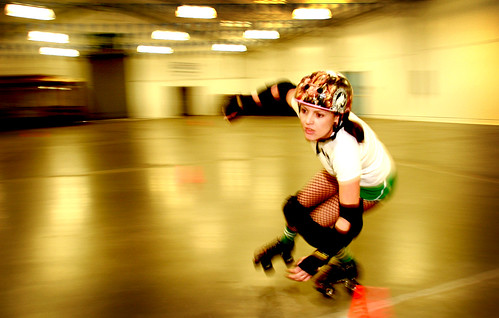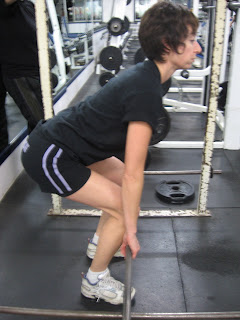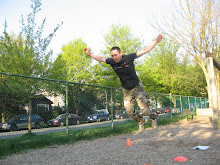Should I Skate More to Get Better at Roller Derby?
Thoughts on Devoting Time to Developing General Athleticism and All-around Physical Development
The best way to get better at roller derby is to practice and compete in roller derby. To a point this makes sense. Roller derby-specific training sessions are the best way to learn the specific skills of your sport (and your position). And, good roller derby training will serve as the basic method to condition you in the specific ways that your sport demands.
The Perils of Too Much Specificity (or too much skating)
This specific training, however, ought to be done in moderation, and it ought to be accompanied by more general athletic training. The reason I want to stress this is because too much specific training for a particular sport engenders imbalance. And in skating sports such as roller derby this can be very pronounced. Hockey players (who, as a group, are much more well-studied than derby competitors) are generally known to have major imbalances between the vastus medialis and the vastus lateralis (crudely the inside and the outside musculature of the thigh) due to the strong strong lateral push of the skating movement. Don't make the same mistake. Perhaps the number one point to take away from this article is that a derby competitor generally shouldn't spend a lot of time skating or reproducing skating-like movements during the off-season and in your non-practice workouts (those done without your team). You will get plenty of skating in during the season as your team practices. Variety in your training will help to build a foundation of general physical development and therefore temper the dangers of too much specificity before it becomes a problem.
Being able to perform a particular sport at a high level does not mean that one has a body in balance. The body may be beat up after a hard season of collisions, lack of proper recovery, and repetitive strain. Certain desirable physical qualities may be lagging behind. It is likely that your strength is down after so much skating and conditioning work. At the end of the season a more general approach to training is called for: pare things down, renew the foundation of strength, and then add on to that foundation before the next season begins. This is also an opportunity to develop and restore your overall heath. Specialization does not make for a healthy individual. Extended periods of hard training along with the stresses of competition, especially when not addressed with plenty of rest and active restoration, can also be detrimental to overall health and well-being.
General Training Phase
General training is done particularly in the off-season and trains your body more generally in broader athleticism, strength,and fitness. It is not geared specifically towards the qualities needed for a specific sport but instead seeks to make the athlete more well-rounded, broadly conditioned, more resistant to injury and more mobile with fewer of the imbalances or gaps that sport-specialized training can open up if trained too much.
This approach to training can help relieve over-training, and both emotional and physical stresses involved in training and competing for a particular set of demands. It is a time to develop general athleticism, meaning that you are developing yourself into a better all-around physical being, who is stronger, faster, more powerful, resilient and with better movement skills than you had last season. Training can include diligent attention to:
-rest & recovery
-addressing imbalance/ restoring balance
-respecting and healing current injuries and attending to those that may be brewing
-strength
-work capacity (this allows you to do more work during a training session or a competition)
-general athleticism
-your weak points as an individual
-variety and fun
I cannot emphasize enough the importance of developing overall strength at this time. Big multi-joint movements such as the squat, deadlift, various forms of pressing and pull-up progressions will go far to getting you ready for your rough sport and will also make the most economical use of your time in the gym. Spend time playing other sports or recreational activities that are far removed from skating. Develop new physical fluencies. Train with athletes from other sports. The point is that you are renewing and developing yourself and also building a strong foundation for more specialized, sport-specific, training. This foundation should be renewed regularly, and shouldn't be rushed. Training guru Gray Cook states things nice and clearly, "The biggest mistake made in sports medicine and sports conditioning today is moving to sport-specific movements too quickly."
In closing I would like to mention that general training is not only for the off-season. During the season too it is important to prevent muscle imbalances and maintain work capacity. This is more difficult to achieve during the demands of frequent practices but as you garner more experience in structuring your off-season training the more successfully you will be able to fit it in during the season.
Sunday, December 27, 2009
Tuesday, December 1, 2009
Pull-up Progression with Bands
For the vast majority of women, the ability to complete chin-ups and pull-ups may seem like a really far-off physical feat.
Yet, pull-ups and chin-ups are amongst the very best movements for developing strength in the back (and in the case of chin-ups, the biceps too).
What's a woman to do?
One alternative is to use Jump Stretch style bands for some added assistance.
For more information on progressions with bands please visit the Terminal City Training blog:
http://www.terminalcitytraining.com/1/post/2009/12/video-band-assisted-pull-ups.html
Yet, pull-ups and chin-ups are amongst the very best movements for developing strength in the back (and in the case of chin-ups, the biceps too).
What's a woman to do?
One alternative is to use Jump Stretch style bands for some added assistance.
For more information on progressions with bands please visit the Terminal City Training blog:
http://www.terminalcitytraining.com/1/post/2009/12/video-band-assisted-pull-ups.html
Thursday, October 8, 2009
Off-season
So it's off-season now, around these parts anyways. Time to get wickedly strong. How will you do it? At the gym, at home, outdoors. You can use conventional or unconventional tools and methods. I like to use both. Don't let lack of money, hatred of the gym, or anything else stop you.
If you are interested in unconventional training methods you may like the new article, "What Can I Do With My Sandbag," at my blog:
http://tinyurl.com/yzcqnxg
If you are interested in unconventional training methods you may like the new article, "What Can I Do With My Sandbag," at my blog:
http://tinyurl.com/yzcqnxg
Wednesday, August 26, 2009
Tribute to Women of Strength
This is a great video I stumbled across this evening. More and more women are tuning into athletic/"strongman" style training and I am psyched about this. Please ignore the cheesy "strong is sexy" title at the beginning if you can.
Thursday, July 16, 2009
in-season training
Here in Vancouver at least derby season is well underway. Those who strength trained during the off-season may be struggling to keep strong while the season is in full-swing. In many sports athletes train diligently during the off-season and start the season feeling stronger, faster, and better than ever. However, the rigours of a full training schedule, competition, and responsibilities like work and family often mean that supplemental strength training falls to the wayside. The athlete finds themselves weaker, slower, and therefore more prone to injury as the season advances.
Clearly the strength gains that you worked so hard for need to be maintained.
Here are some points to help you do that:
-Remember that practices and, especially, bouts are the priority. In-season strength training must not interfere with your performance.
-Strength is much easier to maintain than it is to acquire. One or two days a week will be enough for most athletes.
-Don't worry about setting new personal records (PRs) in the off-season. Maintain what you have built. If you consistently have lots of extra energy and no bout approaching then, sure, go for it.
-Keep the trainig sessions short. You don't need to do everything. If you are strength training twice weekly then break up the important exercises between the two sessions. Keep volume low.
-Optimize recovery with lots of sleep, naps, sound nutrition, and active recovery such as contrast baths, light movement, foam rolling, massage, etc.
This ought to help you start and end the season strong, powerful, and resilient.
Please send any questions to terminalcitytraining@gmail.com or post them in comments.
Good Luck,
Al
Clearly the strength gains that you worked so hard for need to be maintained.
Here are some points to help you do that:
-Remember that practices and, especially, bouts are the priority. In-season strength training must not interfere with your performance.
-Strength is much easier to maintain than it is to acquire. One or two days a week will be enough for most athletes.
-Don't worry about setting new personal records (PRs) in the off-season. Maintain what you have built. If you consistently have lots of extra energy and no bout approaching then, sure, go for it.
-Keep the trainig sessions short. You don't need to do everything. If you are strength training twice weekly then break up the important exercises between the two sessions. Keep volume low.
-Optimize recovery with lots of sleep, naps, sound nutrition, and active recovery such as contrast baths, light movement, foam rolling, massage, etc.
This ought to help you start and end the season strong, powerful, and resilient.
Please send any questions to terminalcitytraining@gmail.com or post them in comments.
Good Luck,
Al
Saturday, May 16, 2009
Get Strong! Outdoor Training Camps

I am currently putting together plans for more month-long outdoor training camps this Summer and Autumn, most likely in July and September (with possibly more opportunities). This follows up on our successful morning camp which ran through April.
Small groups will meet evenings or mornings. Dates and times are yet to be finalized and I would like to be as responsive as possible to the scheduling choices of those who show prior interest. So, drop me a line if you are interested in participating.
UPDATE: July sessions will run Monday and Wednesday evenings at 7:30. If enough people are interested then additional times can be arranged.
The number of participants for each session will be limited to keep groups more individualized and manageable so don't hesitate to reserve a spot.
Contact Al terminalcitytraining@gmail.com
For more information:
http://www.terminalcitytraining.com/get-strong-outdoor-training.html
Friday, April 24, 2009
Flagrant Self-Promotion
Check out my new article at Straight to the Bar: Nutrition Tips for Jocks, Gym Rats and Health Freaks.
http://www.straighttothebar.com/2009/04/nutrition_tips_for_jocks_gym_r.html
Enjoy!
http://www.straighttothebar.com/2009/04/nutrition_tips_for_jocks_gym_r.html
Enjoy!
Thursday, April 16, 2009
For roller derby athletes (and others) in the Vancouver, BC area who want to pick up an extra conditioning session on Sundays, learn about training with bodyweight and minimal equipment: check out the new Amazing Sunday Conditioning Studio.
These sessions begin, this Sunday, April 19 and will be ongoing on Sunday afternoons at 4.
Hope to see you there!
http://www.terminalcitytraining.com/sunday-conditioning-studio.html
These sessions begin, this Sunday, April 19 and will be ongoing on Sunday afternoons at 4.
Hope to see you there!
http://www.terminalcitytraining.com/sunday-conditioning-studio.html
Thursday, March 19, 2009
Built for "Go" not "Show"

Walk into a gym anywhere any evening and what are the "dudes" usually training? Chest, biceps....ummm... and a little bit of something else for good measure. Call them the mirror muscles or the beach muscles or whatever you want. As a roller derby competitor they won't get you skating much faster. They won't be playing a significant role in injury prevention either.
Not that you want to ignore the front of your body but it makes much more sense to focus on developing your posterior chain, your "go muscles." And just what is the "posterior chain" you might ask? Simply put: the backside of your body but for our purposes here we will narrow this down a bit to the hamstrings, glutes and low back.
Your hamstrings are responsible for flexing your knees.
Your glutes (a.k.a bum) have a number of functions. They extend your hips, abduct your legs (lift them away from body's centre) and allow external hip rotation.
Your low back (spinal erectors) keeps you upright.
Happily there are a lot of exercises to choose from when training these muscles. Below is a far from comprehensive list. Some are pretty well-known and others may seem cryptic. Get to know them, use them regularly, and watch your strength and power increase, and in all the right places!
-glute ham raises (if you are lucky enough to have a GHR bench in your gym or you have built one for yourself
-deadlifts of all sorts
-back extensions
-reverse hypers
-sled dragging
-Olympic lifts (technical and difficult to learn)
-various "strongman" training methods ("strongwomen" can use them too!)
-good mornings
-lunges
-step-ups
-pull-throughs (with bands or cables)
-various movements with kettlebells, swings being the best place to start.
Work hard and enjoy the training!
image credit: Terrence McNally http://www.flickr.com/photos/terrencemcnally/
Thursday, March 5, 2009
Will Strength Training Make Me Bulky?
Will strength training make me bulky? I get this question from women all the time. I think it is largely fueled by photos of female bodybuilders.
If I could state the answer any more clearly I would but I think I can reduce it to one word: "no."
Women, on average, have 1/10th the testosterone of men. This is more or less the bottom line. The image of huge muscular women that many fear is almost always a drug-fueled aesthetic.
The good news is that women can get much stronger through strength training than they are in their untrained state. This can significantly aid performance as well as making one more resistant to injury.
If you are a highly unusual genetic specimen and find yourself getting truly "bulky" then you can choose to stop training. The training effect does reverse over time.
If I could state the answer any more clearly I would but I think I can reduce it to one word: "no."
Women, on average, have 1/10th the testosterone of men. This is more or less the bottom line. The image of huge muscular women that many fear is almost always a drug-fueled aesthetic.
The good news is that women can get much stronger through strength training than they are in their untrained state. This can significantly aid performance as well as making one more resistant to injury.
If you are a highly unusual genetic specimen and find yourself getting truly "bulky" then you can choose to stop training. The training effect does reverse over time.
Thursday, February 26, 2009
Think of Yourself as an Athlete - and Then Train Like One.

Flat track roller derby is a dangerous sport. First of all there is the contact: women are trying to knock each other around and down on the track, and some play dirty. Secondly you are competing on a very hard surface. Thirdly, and not least importantly, this is all taking place on roller skates.
Many derby competitors are in their thirties and older, come from decidedly non-athletic backgrounds, and enjoy the raucous partying that comes along with the roller derby subculture.
A sincere commitment to strengthening and conditioning oneself and one’s teammates makes a great deal of sense in this situation. This means a commitment to pursuing athletic goals outside of practice time. It means living a more athletic lifestyle. This all starts with a change in mindset.
The change of mindset that I am advocating is to think of yourself as an athlete.
Being an athlete does not preclude partying. What it does demand is physical and mental preparation, attention to nutrition, enough sleep, and amongst other things a lifestyle that allows you to recover from demanding training and which engenders solid performance. As a roller derby athlete, seeing as you are involved in a punishing sport, the risks of ignoring these basic considerations deserves deep consideration.
You are an athlete in a contact sport. You’ve probably seen the injuries, heard the stories, felt the thrill of danger. Football players, rugby players, wrestlers, boxers, MMA fighters are all expected to train outside of formal sessions. They all must take their strength, fitness and mental readiness seriously. The risks you share are not dissimilar.
During the off-season it is important to develop your general athleticism, your capacity for strength and power, your mobility, your conditioning, and so on. Because you are not attending and recovering from derby-specific training sessions it is important to do this work three or more times weekly whenever possible.
As team practices and the season begins it is important to maintain the strength, power and other qualities which you worked so hard hand during the off-season. You will not be able to hit the supplementary sessions as frequently but try for twice weekly, or at least once. Plan your training around your derby-specific sessions and your bouts. You must have adequate recovery so that you are able to develop the technical aspects of your game and so that you are feeling buoyant and ready to rumble as your bouts approach.
Take a little bit of down time after your season, just enough to feel fresh again. Then begin another cycle of developing yourself to your athletic potential. If you work harder and more intelligently than your opponents then not only will you be more resistant to injury but you will be more likely to dominate the track.
Subscribe to:
Comments (Atom)



